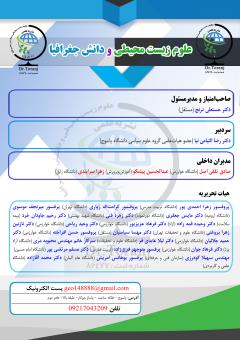تأثیر روش یادگیری مشارکتی بر روی دانشآموزان پایه اول ابتدایی شهر یاسوج
محورهای موضوعی : علوم برنامه ریزیگلنار صالحی خواه 1 , مریم بستام 2 , زیبا بستام 3
1 - دانشگاه پیام نور یاسوج
2 - دانشگاه آزاد بوشهر
3 - دانشگاه دولتی دکتر معین
کلید واژه: روش یادگیری مشارکتی, روش آموزش, انفرادی دانشآموزان نارساخوان, پایه اول ابتدایی شهر یاسوج,
چکیده مقاله :
هدف این تحقیق تأثیر روش یادگیری مشارکتی بر روی دانشآموزان پایه اول ابتدایی شهر یاسوج است و اینکه آیا مشکلات خواندن آنها در گروه و با کمک یکدیگر حل میشود یا خیر؟ بنابراین از دو روش یادگیری یک ساو I و روش جیک ساو II استفادهشده است تا تأثیر آن در بهبود خواندن کودکان و یادگیری آنها بررسی شود. با توجه به موضوع روش نیمه آزمایشی طرح پیشآزمون- پسآزمون انتخابشده است. برای جمعآوری دادهها از مقیاس هوشی و کسلر استفاده شد و برای تعیین میزان اختلال خواندن دانشآموزان از آزمون تشخیص خواندن که معروف به آزمون شیرازی است استفاده شد همچنین از دادههای بهدستآمده حاصل از نتایج پیشآزمون، پسآزمون، آزمون تعقیبی و تأخیری، برای گردآوری اطلاعات استفادهشده است. ضریب روایی85/0 برآورد گردید و ضریب پایایی به روش باز آزمایی در طول یک ماه برای مقیاس کل 0/95 مقیاس کلاس 0/93 و مقیاس عملی 0/9 میباشد که میانه ضرایب پایایی 0/73 گزارششده است. در مرکز اختلالات یادگیری توسط یک مربی در طول هفته به ۲۰ دانشآموز خدمات آموزشی ارائه شد و در دو نوبت ترجیحاً ۴۰ نفر دانشآموز تحت آموزش قرار گرفتند. در این پژوهش با انتخاب تصادفی ۲۰ نفر از دانشآموزان نوبت اول بهعنوان گروه آزمایش و ۲۰ نفر از دانشآموزان نوبت دوم بهعنوان گروه گواه لحاظ گردیده است. اطلاعات جمعآوریشده با استفاده از آزمون t گروههای مستقل t) تست) و از نرمافزار spss جهت کارهای آماری استفاده گردید تا عملکرد دو گروه مستقل آزمایش و گواه مقایسه شود. یافتههای پژوهش مبین آن است که یادگیری مشارکتی در مقایسه با روش آموزش انفرادی در کاهش مشکلات پایه اول ابتدایی مؤثر است از فرضیهها استنباط میشود که یادگیری مشارکتی در مقایسه با روش آموزش انفرادی در عدم افزودن و یا حذف کلمات در متن مؤثر است، پس میتوان نتیجه گرفت دانشآموزانی که به روش مشارکتی آموزشدیدهاند در کسب مهارت خواندن از عملکرد بهتری برخوردار شدهاند.
The purpose of this research is the effect of cooperative learning method on the first grade students of Yasouj city and whether their reading problems can be solved in a group and with each other's help or not. Therefore, two learning methods, One Saw I and Jake Saw II, have been used to investigate its effect on improving children's reading and learning. According to the subject, the semi-experimental method of the pre-test-post-test design has been chosen. Hoshi and Kessler's scale was used to collect the data, and to determine the level of students' reading disorder, the reading recognition test known as the Shirazi test was used. Also, the data obtained from the results of the pre-test, post-test, post-test and delayed test were used to collect information. . The validity coefficient was estimated to be 0.85 and the reliability coefficient was 0.95 for the total scale, 0.93 for the class scale and 0.9 for the practical scale, and the mean of the reliability coefficients was 0.73. In the learning disorders center, an instructor provided educational services to 20 students during the week, and preferably 40 students were trained on two occasions. In this research, 20 students of the first term were randomly selected as the experimental group and 20 students of the second term were included as the control group. The information collected using the t-test of independent groups (t-test) and spss software was used for statistical work to compare the performance of two independent test and reference groups. The findings of the research show that cooperative learning is effective in reducing the problems of the first grade of elementary school compared to the individual education method. It is concluded from the hypotheses that cooperative learning is effective in not adding or removing words in the text compared to the individual education method, so we can conclude It was concluded that the students who were trained in cooperative method have better performance in acquiring reading skills.
• ارنشتاین، آلن سی،(۱۹۹۳). مبانی اصول و مسائل برنامهی درسی جلد ۱و۲ ترجمهی قدسی.احثر.(۱۳۷۶). تهران: انتشارات دانشگاه آزاد اسلامی واحد علوم و تحقیقات
• تبریزی، مصطفی.(۱۳۸۰). درمان اختلالات خواندن. تهران: نشر گفتمان خلاق.
• سیف نراقی، مریم و نادری، عزتالله. (۱۳۸۷). روانشناسی کودکان عقبمانده ذهنی و روشهای آموزش آنها . تهران: انتشارات سمت (در دست چاپ)
• سیف نراقی، مریم و نادری، عزتالله.(۱۳۷۱). بررسی روند رشد تکلم و زبان فارسی کودکان از تولد تا ۸ سالگی. تهران: انتشارات دانشگاه تربیتمعلم.
• فقیهی، فاطمه.(۱۳۸۱). جمعبندی تحقیقات انجامشده پیرامون یادگیری مشارکتی. فصلنامه اعیان و تربیت، دوره هشتم، شماره ۳.
• قلتاش، عباس.(۱۳۸۳). بررسی تأثیر یادگیری مشارکتی بر رشد مهارتهای اجتماعی دانشآموزان پسر پایهی پنجم ابتدایی شهرکرد. پایاننامه کارشناسی ارشد، دانشگاه تربیتمعلم تهران.
• ناعمی، محمد.(۱۳۸۳). روانشناسی آموزش خواندن مشهد. انتشارات آستان قدس رضوی.
• نریمانی، محمد (۱۳۸۰). رفتاردرمانی. انتشارات اتقیا.
• Fleycher, J. and Forman. B. (1994). Issues In Definition and Measurment of Learning Disabilities. In G. Lyon Ed, Frames of Refernce For The Assessment of Children Whith Learning Disabilities. (pp. 185-202). Baltimor: Paul H. Brookes.
• Kavil. K. (1981). Psychopharmacologic Treatment: A Note On Classroom Effects. Journal of Learning Disabilities, 32, 48-55.
• Poblano,Adrian.(2005).Characteristies of Speeific Reading in Children From Neuro Psychologic in Mexico:Salud
• Rareky, B.P. (1991). Neuropsychological Validation of Learding Disability Subtypes. New York: Guliford Press.
• Ring, T. Richard.A. Wesiz. (1976).Intrceduction to Pbychology. Mc Graw- Hill. International Edition. New York.
• Slavin, R. (1990). Research on Cooperative Learning: Consus and Contoovry. Educational Leadership Vol. 4 No. 47.
• Thomson, M. (1995). Developmental Dyslecxia. Third Eddition, Whurr Book, London.
• Torgesen, J. (1981) Problems In The Study of Learning Disabilities. Hertyheri- ngton & J. Hagen (EDS.), Review of Research In Child Development Vol. 5. pp. 162-184.
• Torgesen., J. (1994). Issuse In The Assessment of Executive Function. Batimore: Paul H. Brookes.


